When it comes to movies with that family-friendly, feel-good, group-hug, leave ’em smiling as they go touch of sentimentality that we often look for in this end-of-year holiday season, I’ll be the first to admit that the Criterion Collection isn’t the ideal place to go looking.
After all, the majority of their films seem to have a bit of that darker, existentially bleak edge to them, which usually makes for better art, as it opens up the creative process from the forced “happy ending” that mainstream Hollywood and mass audiences prefer. But I’m ready to take up the challenge of finding not just a few, but a full dozen films that offer sufficiently inspirational material to put us in a grateful state of mind on this Thanksgiving Day.
Even if the full impact of the movies I’m about to list leaves us feeling philosophically ambivalent, or even outright depressed, here are some key moments from some of the great films I’ve been watching since the beginning of 2009 when I first embarked on my multi-year project of viewing the entire collection in its chronological order of release.
I invite you to suggest other scenes that you found uplifting in the comment section below.
1. The Seventh Seal
Courageous Defenders

This is the scene that first came to mind when I thought of this column. Toward the end of Ingmar Bergman’s foundational masterpiece of art house cinema, the doomed and dour knight Antonius Block, realizing that Death is inexorably closing in as their fateful chess match nears its end, suddenly grasps the fact that Death is not merely out to get him, but to take down the kind and innocent family that showed him a moment’s respite one sunny afternoon, serving him fresh picked strawberries and warm milk.
In a desperate but effective gesture, Block upends the chess table, scattering the pieces and momentarily distracting Death, which buys Jof a brief opportunity to make his escape. Both afflicted and gifted with a mystical insight into the supernatural dimension (or merely sharing the same delusions as the war-weary knight?), Jof senses Death’s presence and quickly gathers his wife and child into their caravan to make their escape, probably never realizing Block’s intervention on their behalf. The understanding that my on-going comfort and even existence has probably resulted in unknown ways from the willingness of bare acquaintances, or even total strangers, to stand between me and the power of Death is a humbling thought.
2. Grand Illusion
Faithful Friends

Well after the film’s main action involving the archetypal prison-break from an impregnable mountaintop fortress has occurred, a late scene in Renoir’s anti-war classic concisely illustrates the power of camaraderie in helping us battle through the urge to just give up. Two escapees, the common Frenchman Marechal and the wealthy Jew Rosenthal, make their perilous trek across the German countryside, knowing that being captured means instant death. Rosenthal’s ankle is most likely broken due to a fall, and the men come close to blows due to fatigue and frustration. Finally given the chance to just leave the injured nuisance behind, Marechal heads out alone, increasing his chance of a successful crossing into neutral Switzerland. But he quickly realizes that his personal freedom means nothing if he leaves his colleague behind.
Overcoming his aggravation with Rosenthal, his anti-Semitic prejudice and even the instinct for self-preservation, Marechal does a u-turn, surprising the distraught and weeping Rosenthal, who’d pretty much laid down to die, unable to walk any further under his own power. Sometimes the companionship and encouragement of someone who wouldn’t naturally be our friend can help us get through the lowest points of discouragement and defeat. (By the way, let me just vent here for a moment that I still think it’s abominable that Grand Illusion is no longer in print. I will say no more, I’m keeping my thoughts positive and thankful here, after all. But I’m still pissed at StudioCanal for reneging Criterion’s rights to this particular film!)
3. Great Expectations
Secret Benefactors
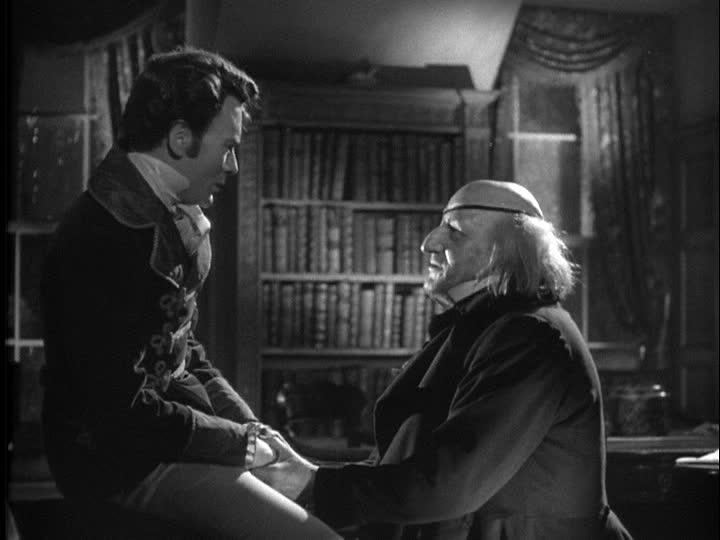
Despite a childhood marred by heartbreaking disappointment and intense cruelty, the orphan Pip emerges into young adulthood without too much residual bitterness or damage to his self-image. That may be attributable in large part to the fact that at a crucial moment in his life, when all seemed lost, an anonymous benefactor came into his life, promising future success and prosperity. Using his naive powers of deduction to piece together the obvious clues, young Pip has a confident sense of how and why such a happy turn of events took place in his life. He even begins to feel a bit smug and entitled to a future of increasing riches and social prestige.
But when he learns the truth about his benefactor, his beliefs are overturned and he has to put together a whole new story about who he really is. To me, the inspirational aspect of this great David Lean film isn’t that Pip’s childhood kindnesses were surprisingly compensated or that occasionally anonymous rich people send poor folks lots of money with no strings attached. Rather, it’s that as we mature, the rude awakenings we experience often demonstrate that the previously hidden back stories of our lives are more amazing and full of surprises than we’d ever believe.
4. Le Million
Random Lucky Breaks

Sometimes good stuff happens to us that’s completely out of the blue and couldn’t be timed any better. In Rene Clair’s early musical comedy, Michel is a starving artist who’s somehow managed to stay one step ahead of his numerous creditors, until one day they all get together as a group and decide that they’re going to settle accounts with him one way or another, once and for all. At the very moment they get Michel into their clutches and he’s run out of excuses, his friend Prosper barges in to let him know that he’s just won the lottery!
Of course, his troubles don’t end so quickly or easily, because the winning ticket has been stored in a jacket that Michel’s girlfriend just gave away to a crook on the lam who’s now somewhere in hiding in the back alleys of Paris. The chase is now on, hilarity ensues and yes, this is one Criterion title that really does offer a happy, sappy ending. Not that there’s anything wrong with that!
5. Sullivan’s Travels
Shared Laughter
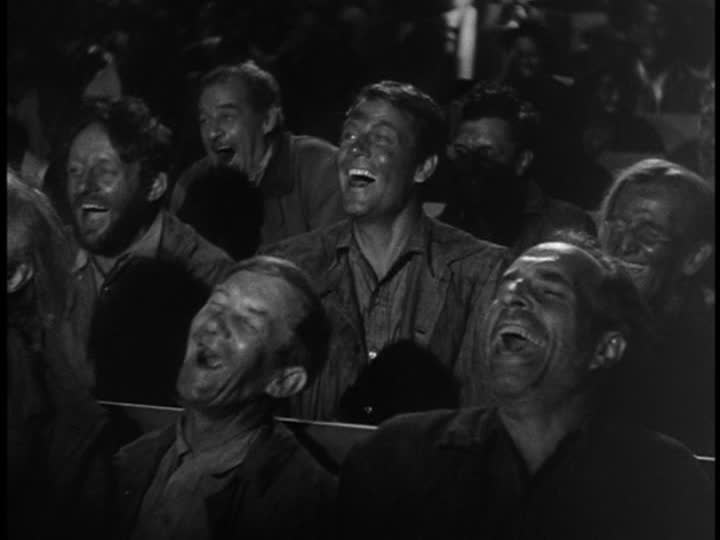
Through several bizarre turns of events, celebrated Hollywood comedy director John L. Sullivan, who hasn’t experienced a day’s hardship in his entire adult life, winds up a forgotten and anonymous prisoner serving hard-time in a chain gang. Unable to secure his release or even convince the authorities of his true identity, Sullivan has no choice but to cast in his lot with his fellow laborers even though they come from a whole different stratum of society than he’s ever known.
One night, after being ushered in shackles into a congregation of humble African-American worshipers, Sullivan gets a whole new perspective on the power of the medium he thought he’d mastered years ago. A post-service movie show featuring Mickey Mouse and Pluto tickles the crowd into uproarious laughter. Suddenly Sullivan realizes the film-making ability he’s developed is more than just a means to a paycheck – it’s a gift he can give to the rest of the world, and a path to his own liberation, physical as well as spiritual.
6. The King of Kings
Healing Touch

Whether it’s a need for miraculous healing or simply the comfort and reassurance of a simple hug, the ability to touch and be touched is a wonderful privilege of life that we do well to practice as often as possible. Cecil B. DeMille’s silent epic The King of Kings presents the story of Jesus Christ as compassionately and sweetly as its ever been told on screen, and in my estimation, it’s still the best “Jesus movie” ever made, in the long and fascinating history of that sub-genre.
Though it’s easy to quibble with many aspects of the film by today’s standards – exaggerated acting, simplistic theology, lingering traces of prejudice and an actor who’s really too old for the part of Jesus – the eloquent visual grandeur and reverent emphasis on Jesus as one who healed and taught others to do likewise is capable of uplifting even the most jaded cinephiles.
7. The Burmese Harp
The Power of Music
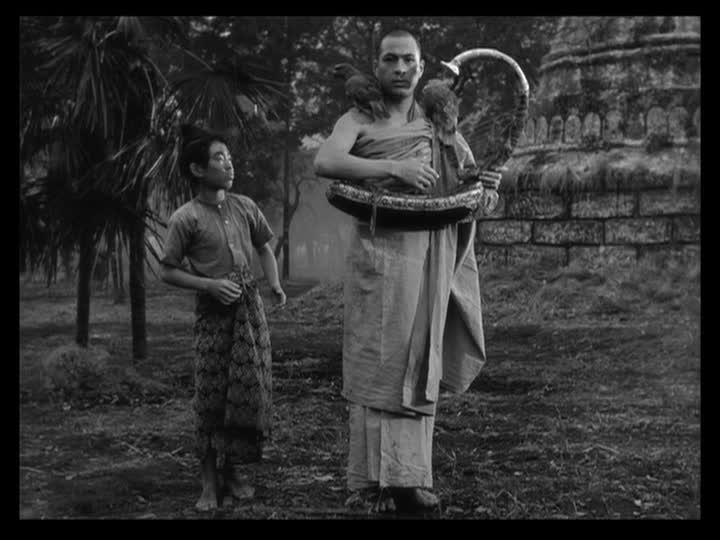
Just as laughter and touch have unique abilities to bring people together, so also music can become more than just a catchy melody – it can usher in a transforming shared experience. The Burmese Harp tells the story of a Japanese soldier who is transformed by the traumas he experiences in war, after he’s separated from his fellow soldiers for a period of time and now follows a higher calling, despite an earnest desire to rejoin them and return home. Unable to address them directly due to his vows and the sheer heaviness of emotion that his decision stirs in him, Mizushima still has a means by which he can not only communicate his intentions but also connect with them in a deeper way than any verbal explanation can convey. Strumming his harp in their presence one last time before they depart via ship to their homes, the warrior-turned-monk makes a vivid impression not only on them, but on anyone who views this film.
8. The Flowers of St. Francis
Unconditional Acceptance
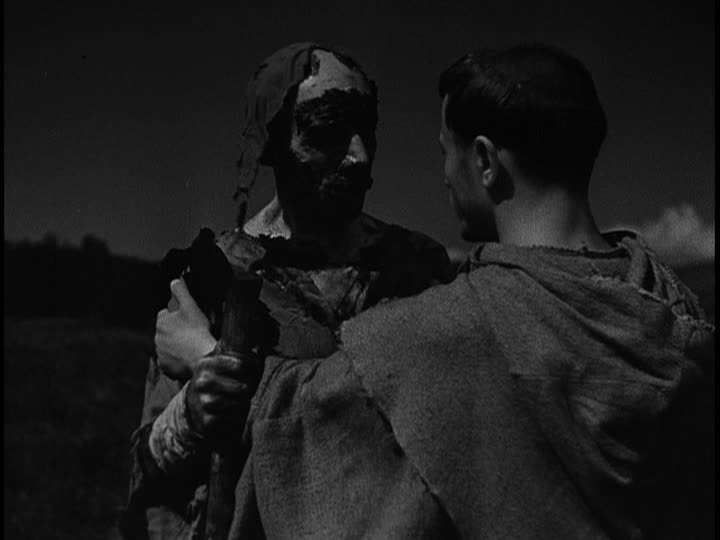
There are times in life when we just need to know that no matter how messed up or repulsive we are to the rest of the world, we still matter, we still are loved by at least somebody. And there are times when we need to dig deep and overcome our own revulsion and disappointment to let someone who depends on us know that we truly respect and accept them for who they are, regardless of how much they deserve it. Roberto Rossellini provides a concrete illustration of this core principle in The Flowers of St. Francis, a neorealist interpretation of the life of Francis of Assisi.
A brief but memorable scene shows Francis at prayer one night, when he’s stirred by the sound of a cowbell worn by a leper who roams in the wee hours when the rest of the world sleeps. The bell’s toll warns others to keep their distance, but Francis instead approaches the forsaken man directly and silently embraces him, ignoring the curses and superstitions surrounding such poor souls in those days. It’s a vivid portrayal of the courage that is often required of us if we seriously dare to show love in this world.
9. A Canterbury Tale
Nature’s Charms

Outside of the realm of human interaction, the natural environment has an ability to infuse our lives with meaning and wonder. Sometimes we experience it best in the company of others, but there are other times when we can’t really tune into nature’s power unless we enter into it in solitude. Powell and Pressburger offered a vivid impression of such a moment in A Canterbury Tale, when Alison Smith, a young woman enlisted into Britain’s war effort of the early 1940s, practically stumbles unawares into a moment of mystic communion with her ancestral past as she strides through what some would consider a sacred grove in the hills overlooking the English town of Canterbury. Spying the ancient cathedral in the distance, and seemingly all alone, a stirring of the breeze ushers in sounds of ages long past. She wheels around, looking to see where the lilting music and chattering of pilgrims comes from, only to learn that such sounds come from within. It’s a memory and a vibration too subtle to tune into when we remain locked for too long in the hubbub of modern civilization.
10. Twenty-Four Eyes
Compassionate Teachers
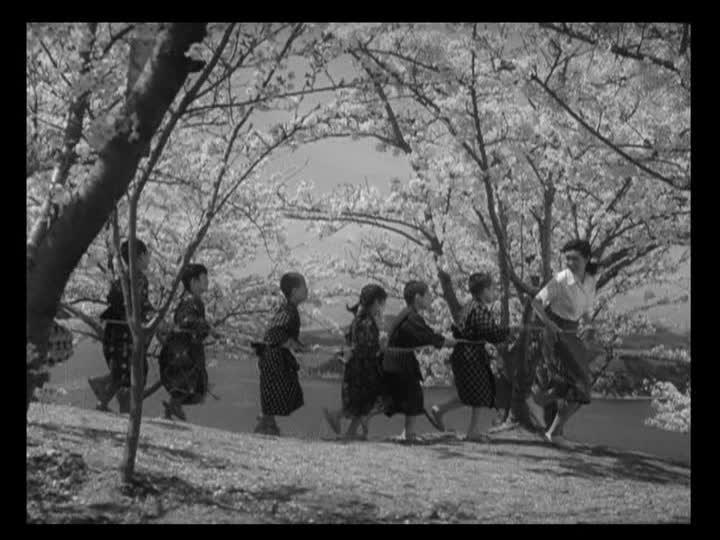
In order to learn to be thankful, we all need to be taught. That’s practically axiomatic, but of course the quality of those who teach us makes all the difference as to how well we acquire that knowledge. Twenty-Four Eyes, a beloved and award-winning Japanese film from 1954, presents one of the most lovable and engaging teachers ever captured on film, Hisako Oishi.
A modern woman for her times (pre-war Japan of the 1930s), she manages to overcome the wariness of her students and especially their parents, winning their hearts through her persistent warmth and enthusiasm even as the local community follows the nation’s lead in their preparations for war and the inevitable losses and tragedies that will follow. Anyone who has ever felt a special bond with a teacher, whether in the classroom or in some other arena of life, will find much to appreciate in this fairly obscure but winsome Criterion title.
11. The Browning Version
Forgiveness
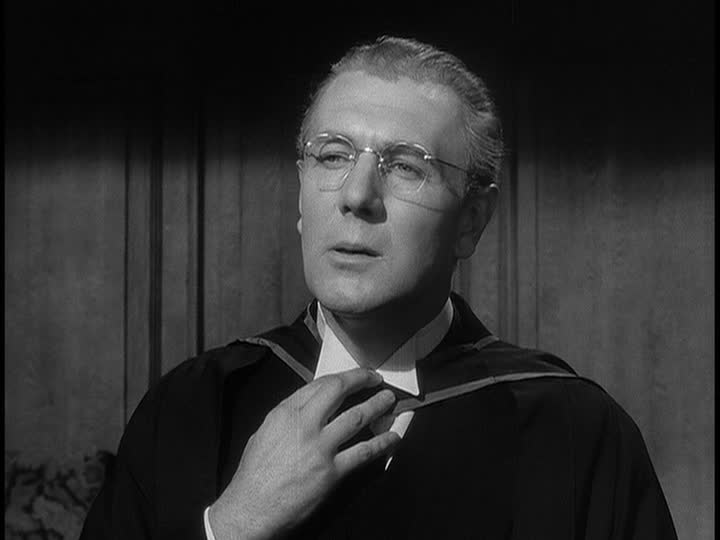
And then, there are those teachers who not only make our schooldays a living hell, they also seem to get altogether too much enjoyment from doing so. The Browning Version drags us into a psychological realm that most students who’ve ever suffered under such petty tyrants probably never thought they’d care to visit, as we catch a glimpse of the interpersonal torments that drive British schoolmaster Andrew Crocker-Harris to unload a barrage of sarcasm and humiliating punishment on his students for no apparent reason other than to see them suffer. To the extent that we only see him as a jerk who deserves the contempt he receives, we miss the point of the film.
For the truth is, the longer we live, the more likely it is that we’re the cause of similar miseries in others, even if we don’t realize it at first, or ever intend such to be the case. The Browning Version’s real lessons and reminders come in the form of the forgiveness that’s shown to “the Crock” at the end of the film, when all that he’s been working and striving for has been pushed aside, mostly due to his own fault. That experience of receiving grace and getting a second chance is just one more thing to be thankful for.
12. Le Notti Bianche
Fleeting Happy Moments
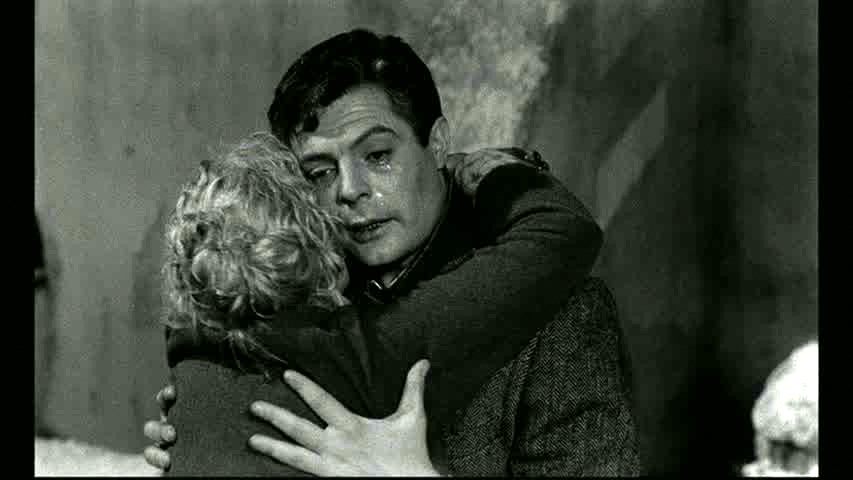
Finally, a film that I just recently viewed, one that definitely plays up the frustration and sadness that amorous pursuits too often seem to lead to, but also carries with it a sly reminder that even in the midst of heartache, there’s still a lot to celebrate. As the old saying goes, it’s better to have loved and lost than not to have loved at all. In Luchino Visconti’s beautifully rendered monochromatic romantic fable, impulsive and oh-so-earnest lovers Mario and Natalia experience rapturous highs and lows over the course of a whirlwind love affair that lasts only four nights and has a predictably unhappy ending. (Oh come on, you didn’t really ever expect that they could just get together and live happily ever after, did you?) Even though Mario, the film’s protagonist, has his hopes raised sky-high by Natalia’s own words just moments before they are cruelly and utterly dashed to pieces, he’s still able to thank her, sincerely but self-protectively I’m sure, for the brief time of happiness and contentment that they were able to share together.
Sometimes I guess that’s just the best we can do, when life and circumstances let us down and we have nothing else to point to. Sure, I like it best when we find happiness in relationships and conditions that can be sustained over the long haul – but when it gets right down to it, life goes by pretty fast, and when we look back at the end of it all, what we’ll probably see is a whole long string of fleeting happy moments, with a few bumps and interruptions along the way. Regardless of whatever afflictions, disappointments and tensions we might be wrestling with this Thanksgiving Day, I think we do well to keep our focus on the good gifts of our lives, and our on-going ability to roll our eyes and wriggle our toes – while we still can.


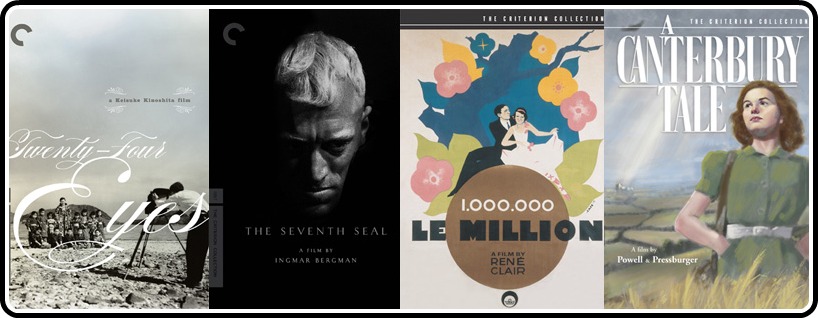
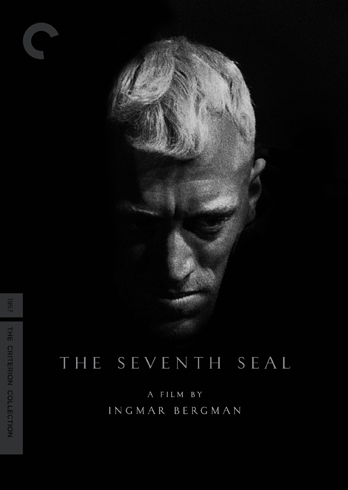
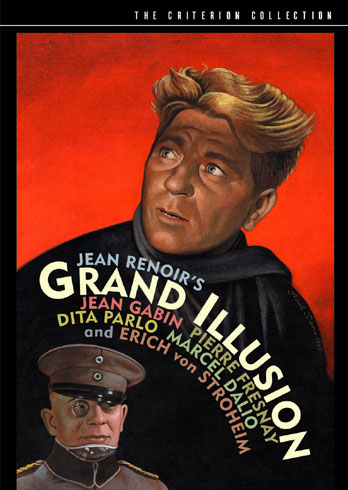





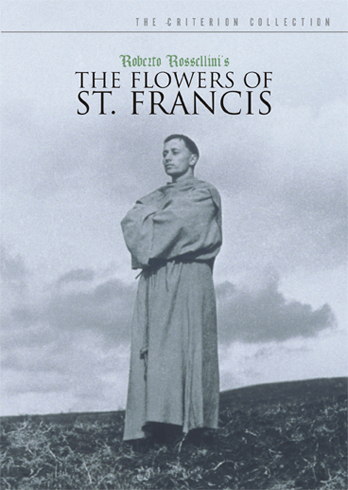
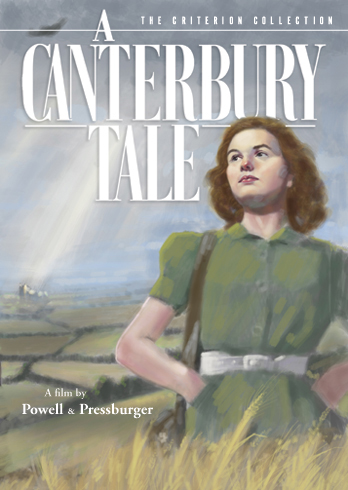
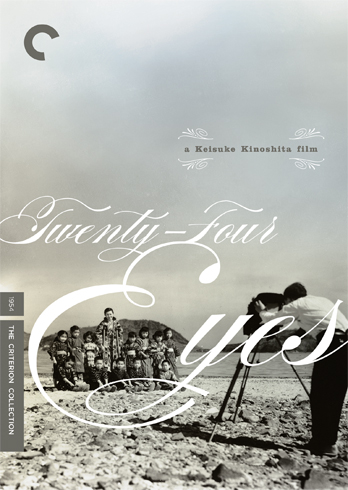

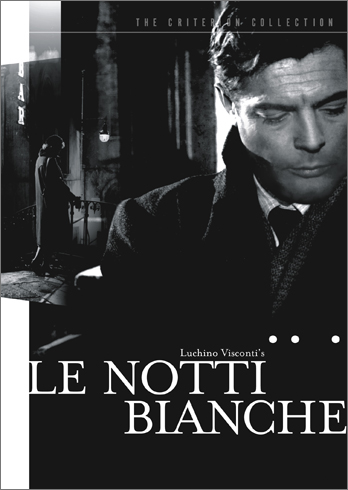

![Bergman Island (The Criterion Collection) [Blu-ray]](https://criterioncast.com/wp-content/uploads/2022/11/bergman-island-the-criterion-collection-blu-ray-400x496.jpg)
![This Is Not a Burial, It’s a Resurrection (The Criterion Collection) [Blu-ray]](https://criterioncast.com/wp-content/uploads/2022/11/this-is-not-a-burial-its-a-resurrection-the-criterion-collection-blu-ray-400x496.jpg)
![Lars von Trier's Europe Trilogy (The Criterion Collection) [The Element of Crime/Epidemic/Europa] [Blu-ray]](https://criterioncast.com/wp-content/uploads/2022/11/lars-von-triers-europe-trilogy-the-criterion-collection-the-element-of-400x496.jpg)
![Imitation of Life (The Criterion Collection) [Blu-ray]](https://criterioncast.com/wp-content/uploads/2022/11/imitation-of-life-the-criterion-collection-blu-ray-400x496.jpg)
![The Adventures of Baron Munchausen (The Criterion Collection) [4K UHD]](https://criterioncast.com/wp-content/uploads/2022/11/the-adventures-of-baron-munchausen-the-criterion-collection-4k-uhd-400x496.jpg)
![Cooley High [Criterion Collection] [Blu-ray] [1975]](https://criterioncast.com/wp-content/uploads/2022/11/cooley-high-criterion-collection-blu-ray-1975-400x496.jpg)